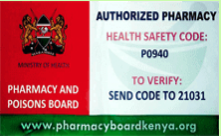
Sickle Cell Care That Fits Your Life with Mzima
Prevent crises, manage symptoms, and get consistent support from the Mzima Program.
What is Sickle Cell Disease?
Sickle cell disease (SCD) is an inherited blood disorder. A genetic change causes red blood cells to become hard, sticky, and shaped like a crescent or sickle. These cells break down early (leading to anaemia) and can block small blood vessels, causing pain and organ damage.
Globally, SCD affects millions, with the highest prevalence in sub-Saharan Africa. Around 75% of the world’s cases occur in Kenya. It is a lifelong condition, but consistent care reduces complications and improves quality of life.
-
99% HIV Prevention Effectiveness
-
Take daily for maximum protection
-
Pair with condoms for added STI prevention

Why It matters?
Without consistent care, SCD can cause:
Pain crises (vaso-occlusive episodes)
Acute chest syndrome (a medical emergency)
Stroke (especially in children)
Severe anaemia and infections
Organ damage over time (lungs, kidneys, eyes)
Signs & Symptoms
Common signs and symptoms include:
- Pain episodes (sudden or ongoing)
- Fatigue, shortness of breath
- Yellowing of the eyes/skin (jaundice)
- Swelling of hands and feet in young children
- Fever or infections that worsen quickly
Best advice: Seek urgent care for chest pain, difficulty breathing, stroke-like symptoms, or high fever.
Managing Sickle Cell Disease
SCD management combines healthy daily habits, vaccinations, and medicines to reduce complications.
Lifestyle Tips (Global Standards)
Stay hydrated; avoid extreme temperatures.
Prevent infections with hand hygiene and vaccinations.
Avoid smoking and limit alcohol.
Regular exercise, tailored to tolerance.
Eat a balanced diet with folate-rich foods.
Develop and follow a personal pain plan.
Medication & Clinical Support
Hydroxyurea to reduce pain crises and acute chest syndrome (adults and children as indicated).
Penicillin prophylaxis in young children.
Vaccinations (including pneumococcal and influenza).
Regular screenings (e.g., transcranial Doppler in children to assess stroke risk).
Blood transfusion/exchange transfusion in selected cases.
Genetic counseling for individuals and couples.
Your Mzima care team will help coordinate medicines, monitoring, and preventive care.
Your Mzima care team will help coordinate your medicines, monitoring, and preventive care.
How the Mzima Program Supports You
When you join the Mzima Program for SCD, you will receive:
Care plan
Personalized SCD care plan and crisis-prevention education.
Follow-ups
Free monthly follow-ups with a healthcare provider.
Medicines
Access to affordable medicines (hydroxyurea, penicillin) and supplements as available.
Delivery
Home delivery of medicines.
Labs
Lab linkages for hemoglobin checks and screenings.
Counseling
Genetic counseling and caregiver support.
Referral to specialists when needed.
Join the Mzima Program for Sickle Cell Disease
Frequently Asked Questions
Below are some of the Frequently Asked Questions about Contraceptive Methods
The only established cure is bone marrow/stem cell transplant for selected patients; most manage long-term with medicines and preventive care.
It is often recommended for children and adults with SCD to reduce crises and complications.
Yes, with precautions — stay hydrated, avoid extremes, and pace yourself.
Pneumococcal, influenza, and all age-appropriate vaccines are recommended.
Encourage fluids and prescribed medicines, keep warm, and seek urgent care for severe symptoms.

 iOS
iOS
 Android
Android







